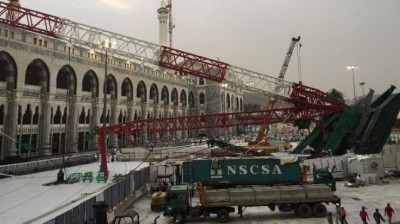 The Saudi authorities need to be helped to make the annual pilgrimage safer
The Saudi authorities need to be helped to make the annual pilgrimage safer
From Hajiya Bilkisu Yusuf, respected journalist and civil society activist to Abubakar Abdulkadir Jega and Musa Hassan Alkali, Justices of the Appeal Court to Tijjani Almiskin, a Professor of Islamic Studies and traditional rulers of repute, the list of eminent Nigerians who died in the Hajj stampede last week in Saudi Arabia seems longer than many initially imagined. And as the identities of the victims come to light, it is also becoming very clear that this is one of the biggest Hajj tragedies to befall our nation.
Last Sunday, Alhaji Abdullahi Muhtar, chair of the National Hajj Commission, said that a total of 56 Nigerian pilgrims – 42 from nine states, two from the commission and 12 persons who worked for tour operators – were killed, while 61 sustained different degrees of injuries in the stampede. But from all indications, many Nigerian pilgrims are still unaccounted for which means that the figures might turn out to be more at the end of the day. Indeed, at the last count, the number of the dead has moved up to 64. Even at that, it would still not tell the complete story of the tragedy.
A local government caretaker chairman from Sokoto State lost his life along with that of his two wives, mother and stepmother in the Jamarat stampede. But what seems to be compounding the tragedy is the report that the bodies of some Nigerian pilgrims killed in the stampede were still being kept in ambulances and had started to decompose. We hope the Nigerian Hajj authorities will move in quickly to resolve the problem, especially in the light of the latest presidential directive that all our pilgrims be accounted for.
As the nation mourns the several Nigerians caught in the Hajj tragedy, it is important that the losses are not in vain and that will only happen if international pressure is brought to bear on the Saudi authorities to ensure that such tragedies do not happen again. “The President has taken note of the assurance by the Government of Saudi Arabia that Thursday’s catastrophe will be investigated and urges King Salman to ensure a comprehensive and thorough exercise that will identify any flaws in Hajj organisation with a view to avoiding a recurrence of such tragedies during the annual pilgrimage”, said a statement from President Muhammadu Buhari’s spokesman.
While we commiserate with the grieving families, especially in our country, as we wish speedy recovery for those that were injured, it is important that the moment not be missed. Against the background that less than two weeks before the Mina stampede, 118 pilgrims (including some Nigerian pilgrims) also lost their lives when a construction crane crashed into Mecca’s Grand Mosque, there is need to look at the entire Hajj operations holistically. The argument is that to the extent that Hajj is one of the five pillars of Islam, its planning should also be a global Islamic responsibility rather than being the exclusive preserve of the Saudi authorities.
As we said last weekend, the Saudi authorities have tried to adapt and have actually put in place modern structures to deal with the challenge of the huge population that descend on their country every year for the annual Islamic pilgrimage. There are also issues that the Hajj authorities and Islamic scholars in our country might also have to consider, including whether indeed those who perform Hajj cannot skip the ritual of stoning the devil which has become risky.
The idea comes against the background that on a yearly basis, death at Mina accounts for most of the fatalities connected with Hajj operations.
If skipping the ritual does not invalidate the performance of Hajj, there is no reason why such should not be considered. People who go for Hajj should be returning home alive.
END

Be the first to comment